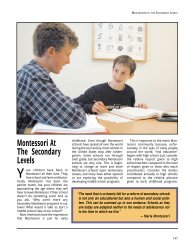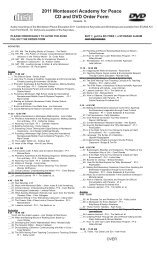Tim Seldin & Paul Epstein Ph.D. An Education for Life
Tim Seldin & Paul Epstein Ph.D. An Education for Life
Tim Seldin & Paul Epstein Ph.D. An Education for Life
Create successful ePaper yourself
Turn your PDF publications into a flip-book with our unique Google optimized e-Paper software.
MONTESSORI PROGRAMS<br />
Genetics play an enormous role. In<br />
addition to the more obvious issues<br />
such as our sex, eventual height, and<br />
the color of our eyes, genetics determine<br />
our special gifts and handicaps,<br />
predispositions, and many aspects of<br />
our interests, talents, and personalities<br />
that scientists are only now beginning<br />
to understand.<br />
However, whatever potential or predispositions<br />
we inherit from our parents,<br />
they will only be developed if our<br />
bodies are allowed to develop normally.<br />
A child who is malnourished in the<br />
critical first six years of life, or who suffers<br />
a devastating disease or physical<br />
injury, will normally develop much less<br />
of his or her potential as a human<br />
being than one who enjoys good<br />
health.<br />
Equally important, and most relevant<br />
to this book, is the question of the<br />
176<br />
child’s early education. Of course the<br />
brain is not a muscle, but like a muscle,<br />
the brain only develops through active<br />
use. This is especially true in the years<br />
of infancy and early childhood.<br />
In the past, many people pictured a<br />
child’s mind as a blank slate on which<br />
adults, through instruction, could<br />
“write down” the content of a good<br />
education. Likewise, another common<br />
metaphor was that of an empty bowl,<br />
waiting to be filled with the contents of<br />
the school’s curricula. Montessori<br />
demonstrated that both concepts are<br />
inaccurate.<br />
The young child’s mind is more like<br />
that of an acute observer or scientist,<br />
eager to learn, explore, try new things,<br />
and master new skills. But most importantly,<br />
she recognized that with stimulation,<br />
the child’s ability to concentrate,<br />
absorb, and master new ideas<br />
and skills increases, and that the earlier<br />
we begin a program of intellectual,<br />
physical, sensory, and artistic education,<br />
the more dramatic the result.<br />
This is a time of great sensitivity to<br />
language, spatial relationships, music,<br />
art, social graces, and so much more.<br />
If, during this period, the mind is stimulated<br />
by the child’s exposure to a rich<br />
environment, the brain will literally<br />
develop a much stronger and lasting<br />
ability to learn and accomplish. In<br />
short, while our culture may believe<br />
that preschool teachers are the least<br />
significant educators our children will<br />
encounter, in reality the contribution<br />
that they offer is of incredible importance<br />
in a child’s education.<br />
This is especially true of those who<br />
teach infants and toddlers. So please<br />
<strong>for</strong>give us when we cannot hide our<br />
frustration when parents say things




